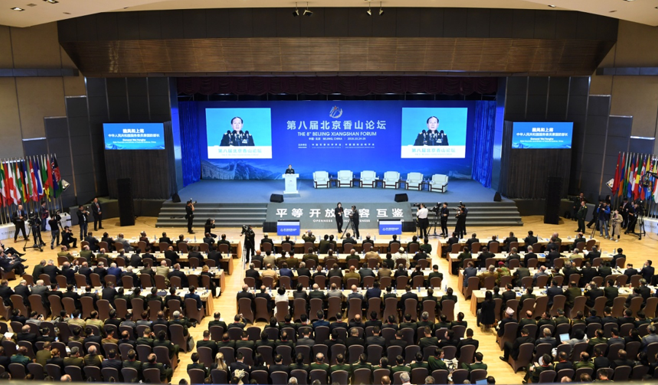
 0 Comment(s)
0 Comment(s) Print
Print E-mail China.org.cn, October 26, 2018
E-mail China.org.cn, October 26, 2018Building a new type of security partnership of equality, mutual trust and win-win cooperation, as well as fighting against terrorism, topped the agenda at this year's Beijing Xiangshan Forum from Oct. 24-26.

Speaking at the opening ceremony, Zhang Hanhui, China's assistant minister of foreign affairs, said that, over the past four decades, China had made remarkable achievements through opening-up and reform, and had always been committed "to the path of win-win cooperation" with the rest of the world.
"We have contributed more than 70 percent of the work on alleviating global poverty, and provided about 160 countries and international organizations with almost 400 billion yuan (US$57.6 billion) in aid. The Belt and Road Initiative has created more than 250,000 jobs for the countries along the routes," he stressed.
These efforts had helped develop the global economy, as well as maintaining world peace, meeting the common expectation of people from all countries. Therefore, China advocated dialogue and consultation on an equal footing to properly address international issues, based on the rules and consensus.
"We hope this forum could provide a platform to discuss new ideas and approaches for international security governance that is based on win-win cooperation, instead of the unilateralism upheld by some countries, which disregards the interests of other countries and peoples," Zhang declared.
Ng Eng Hen, Singapore's minister of defense, said in his keynote speech that to enhance the security partnership, military and defense leadership interactions were needed to build trust and confidence among different countries, leading to "a more significant institutional balance."
Ng went on: "China needs the world as much as the world needs China. As a rising power, China's development will benefit the region and the world, [while] it is stepping up efforts in maintaining the world security partnership."
During the forum, various other officials and scholars stressed the importance of enhancing the security partnership in fighting terrorist threats.
There was agreement that the 9/11 terrorist attack in the United States had marked a new phase in growing international terrorism.
Alexander Fomin, deputy minister of defense of Russia, shared his opinions on the trend of global terrorism. "Many terrorist groups are attempting to acquire chemical, biological and radiological weapons with grave effect on humanity, mostly now operating as non-state actors, increasingly taking advantages of porous borders and interconnected international systems of finance, communication and technology."
This reinforced the necessity of collective efforts to combat the trend. He spoke highly of the efforts the Shanghai Cooperation Organization (SCO) had made in combating terrorism.
"Within the framework of the SCO, intelligence cooperation is going well, which sets a good example for different countries to achieve a high degree of political mutual trust," he said.
Ryamizard Ryacude, minister of defense of Indonesia, agreed that successful collaboration against terrorism called for "adherence to international norms and practices, engaging members as equals, and taking into account varied national interests."
Go to Forum >>0 Comment(s)